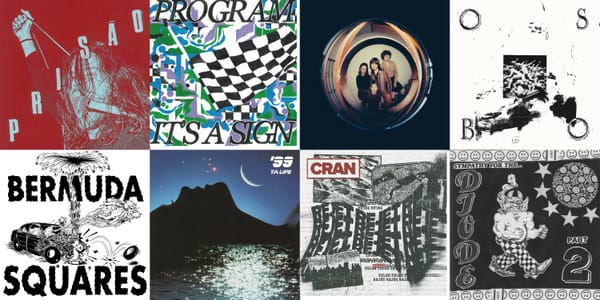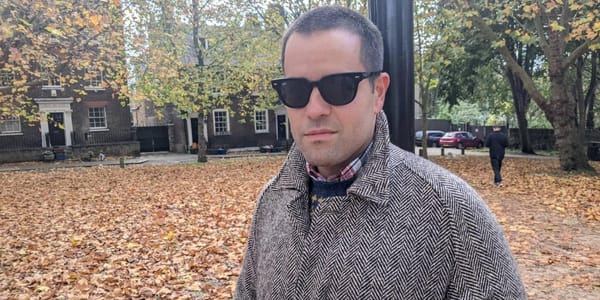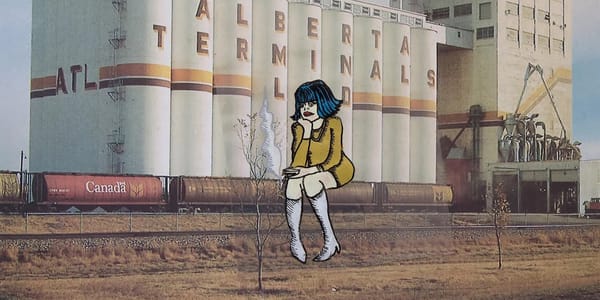interview: barcelona punks enemic interior on their desperate, dreamy post-punk
A discussion of their three EPs and what their dungeon aesthetic truly represents.
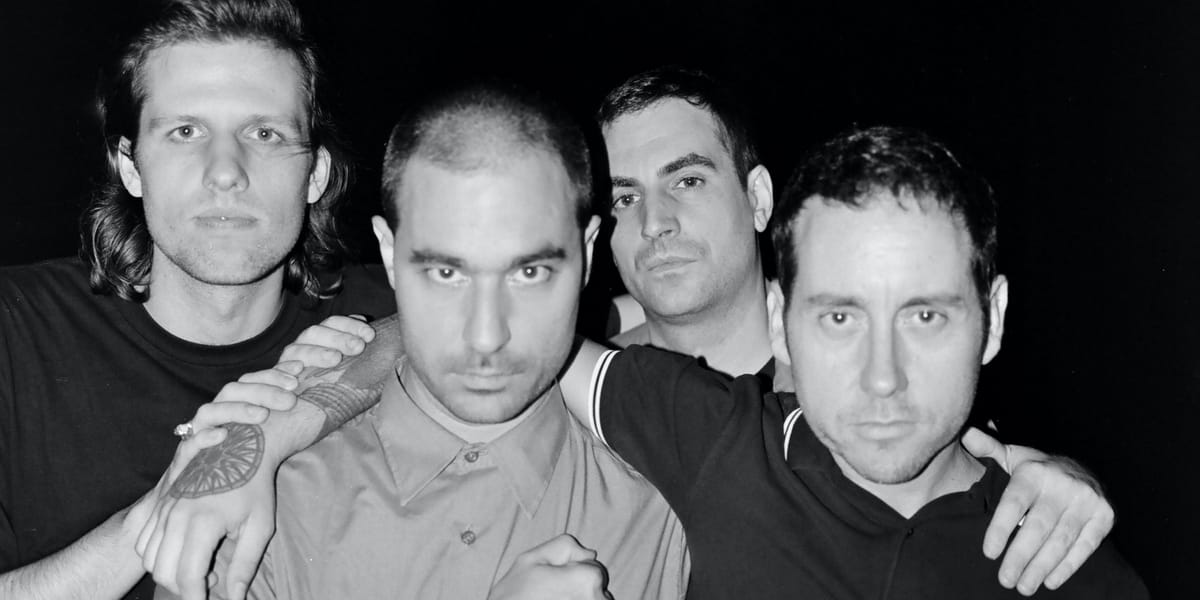
The members of Enemic Interior have shared the lyrics from the songs of their third self-titled EP, but the Barcelona punks aren’t sure the English translations from the original Catalan convey their intentions. Perhaps they were concerned about words like “the magic of blood” or “a lance in my chest.” Paired with the knight on Enemic Interior III’s artwork, listeners might assume that they’re LARPing through the distant past.
“I’m not sure it’s only this dungeon thing,” bassist Sergi Vilà Bori said on a video call. “It’s this dark feeling buried under a lot of different layers and this moment of clarity when you access it. Your body knows this—this access to a pure truth about yourself.” If there’s a central message in these hardcore-forward post-punk songs, it’s right in the translation of the band’s name—they’re shouting about the inner enemy.
Eduard Bujalance, Sergi Algiz, Sergi Vilà Bori, and initial drummer Uriel Garcia didn’t arrive quickly at the band’s sound. “It started as this very organic thing, like the first five songs took a long time to come together,” Vilà Bori said. Once it all clicked into place, Vilá Bori was surprised when Valencia label FlexiDiscos and Under the Gun in L.A. wanted to put out their first record. “We were like...what,” he said. “We started to play punk shows here, and I was very surprised by the welcome from the scene for such a fresh project.”
Vilà Bori says the lyrics connect because of their stripped back, central sentiment—that everyone has a shadow to wrestle with. “Essentially they’re emo lyrics,” said Teddy Baker, who joined the band on drums for their most recent EP. “That’s something that gets said a lot between the four of us, but obviously it doesn't sound anything like an emo band.” They’re also always talking about their attempts to make each song sound “more desperate.”
Enemic Interior III is out now. The band are in the final days of a monthlong European tour. When we spoke in February, they noted it would be a big change from their normal routines; Vilà Bori does graphic design, Baker does research and analysis for non-governmental organizations, Bujalance did work at a medical center, while Algiz ships records and produces commercial music. “For me it’s super crazy—I’ve never toured more than four days,” Vilà Bori said. “And I’ve never toured,” Baker added. Go see them if you can.

What were some of the touchstones that helped inform the sound you were all reaching for?
Sergi Vilà Bori: I would say the three of us, like Edu, Sergi and I, and afterward when Teddy came, we all valued a pop heart in the sense of melody. It’s not strictly a hardcore thing—you can really see the heart of pop in the songs, these melodies that stay with you. This is intentional. We all love pop records by the Cure. Edu, for example, was really into dark fantasy, dungeon synth, this kind of stuff. Sergi has another project called SDH, which is basically synth pop. He’s also into a lot of different industrial experimental stuff. I would say I’m the more limited one in the sense that I don't investigate that much. We all love Blitz records.
Teddy Baker: I remember the thing that you guys said to me when I joined was the thing you were talking about was the second Blitz record. That was one of the big points I think.
SVB: I also love the Marked Men records. Jeff Burke is an idol—the way he sings and builds up songs. There’s this band called Lost Balloons he did in Japan, which is like the poppiest stuff he did. I’ve been listening to a lot of flamenco music and a lot of traditional Spanish music as well. Everyone has a very broad view. We are not punk fanatics in that sense.
Are you thinking about doing a full album?
SVB: We haven’t decided yet. It would be nice to make an album—it just feels natural, no? But then there’s also like this feeling of “fuck off, we make EPs.” It’s faster, and it’s just another way of doing it. Since the beginning, I said that the only rule I set when I got involved in the project was to avoid long songs. The music I admire the most is less than two minutes, always. Like when we’re writing, I’m like “Can we skip this part? Maybe we can avoid the repetition of it?” Maybe if we do an LP, it would be like a 15-minute album. What I really love about this project from my side is that things are very simple. Recording doesn’t take very long.
TB: When I think about the EP/LP thing, I think about like, the band that was coming to mind is Warthog. Warthog only released EPs, and they're all unbelievable. A perfect band, they’re so fucking good. You don’t necessarily need to make it long just because that’s what everyone else does.
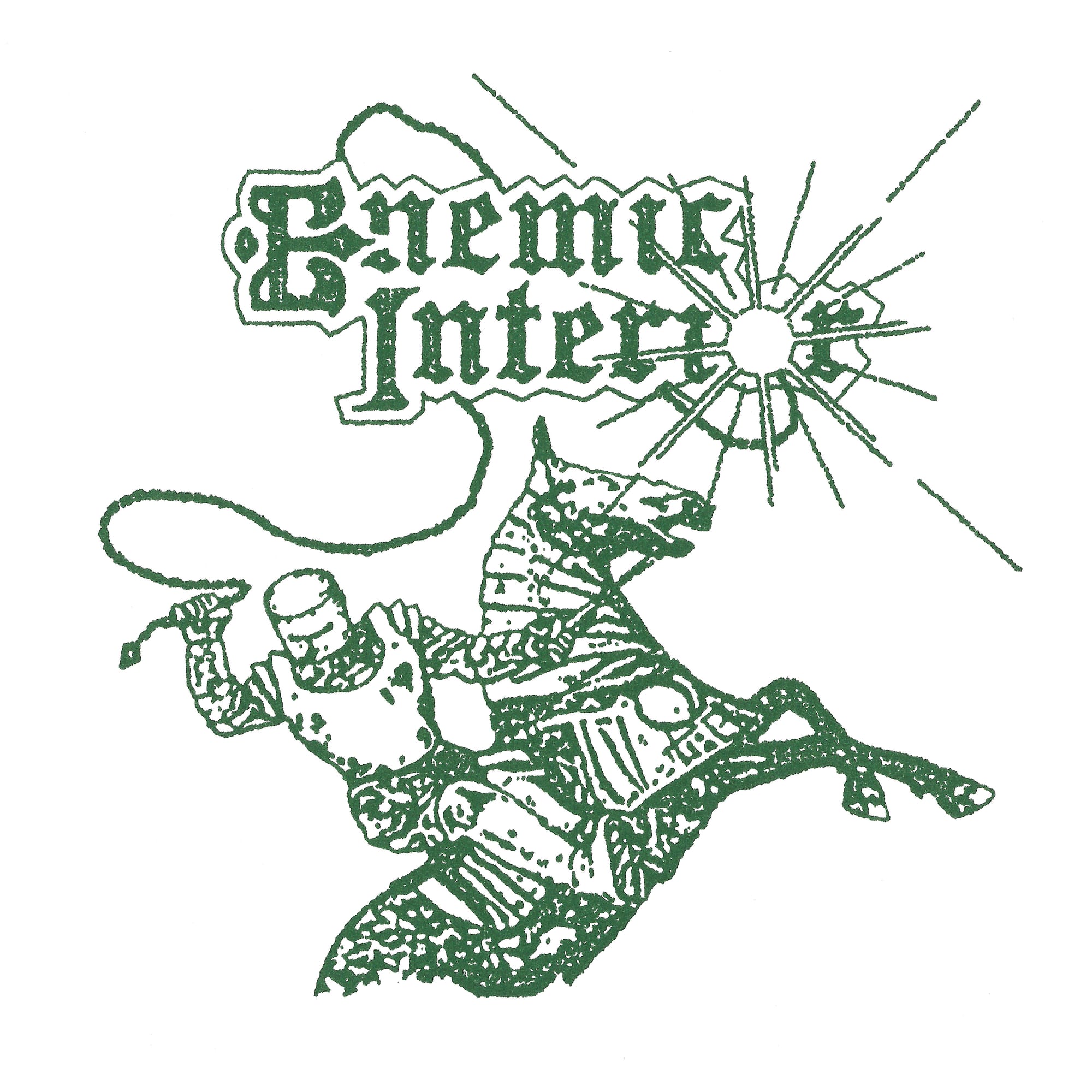
Who does the artwork? How did you end up with this look?
SVB: David Soto is a friend from Vic, a small city about an hour from Barcelona. We met him maybe 10 years ago, because in that small town, they used to do this festival for bands who hadn’t released an album yet. It could be any different style. David was collaborating with the festival on the artwork. He’s not a professional illustrator or anything. He works as an electrician, but he owns this huge photocopier. He does everything at home, and he normally takes around six months to deliver artwork. When he delivers one, it’s like, “OK David, start working on the next one. We’re going to record in three months, so I guess we’re gonna need your artwork in six.” We really wanted something like this dungeon feeling—a kind of dark fantasy vibe. Every one he’s done is better than the last one.
TV: It’s almost like a Pokémon. It’s evolving. It’s getting bigger and better each time and eventually it’s going to be like this massive knight doing something mental.
Is there anything about your politics you want listeners to understand?
TB: I don’t think the lyrics will ever veer into political territory, at least not overtly. I don’t think it’s that kind of band, but that’s not to say that we don’t all have our own own positions on things. We’re not massively active on social media, and this is our second interview ever. We’re not putting our views out there all the time, but we’re certainly not afraid to do that. The most recent relatively political thing we did was we sold a pressing to raise money for aid to Gaza. If we think it’s something worth doing, we will.
SVB: I think the lyrics are not explicitly political in that sense, but they really speak about human nature. In the last record there’s a song called “Pilars De La Decadència,” and it’s not super obvious, like a song about murdering a cop, you know? It goes to a deeper level, like a feeling about how we relate to the world. On the second record, there’s a song called “La llum,” which speaks about the total cataclysm of civilization and how I was dreaming about it. I felt terrified about a nuclear apocalypse. But like Teddy said, I think it’s more about actions and less about the lyrics. Nobody was saying or doing anything in our community and we were like, we should do something. Then we did like this 7" thing and there were people writing emails to us: “You are supporting Hamas.” A lot of crap like that. I was like, this is a good sign. This means we're doing something good, you know? Then we got an email from a booker from our city who wanted to book us a show for November for like 100 people, but then he was like, “You cannot play anymore for the whole year in your city.” I was like, the fuck man! So yeah, I think it’s more about what you do than what you say.

